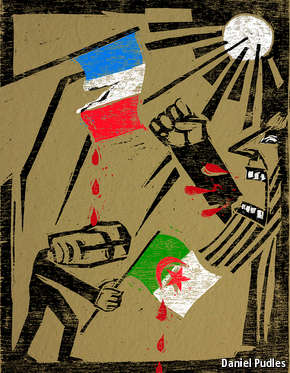
The Meursault Investigation. By Kamel Daoud. Translated by John Cullen. Other Press. 143 pages; $14.95. To be published in Britain by Oneworld in July.
WHEN Albert Camus first published his best known work, “L’Étranger” in 1942, Algeria was still a colony of France, and “the Arab” killed by the book’s anti-hero, Meursault, had no name. Seventy years on, that omission is rectified in a scorching debut novel that is sure to become an essential companion to Camus’s masterpiece. He was called Musa.
“The Meursault Investigation” by Kamel Daoud, an Algerian journalist, is a biting, profound response to French colonialism. It is also a lamentation for a modern Algeria gripped by pious fundamentalism. And it has earned the author both the 2015 Prix Goncourt for best first novel and a Facebook fatwa from a minor Muslim cleric calling for his death.
The book starts as a caustic, rambling monologue told by an old man in a bar to an appropriately nameless French expat. The narrator is Musa’s younger brother, Harun; he says he and his mother are “the only genuine heroes of that famous story”. Night by night he unwinds his version of the tale Camus told, seeking justice for Musa, condemning the “insulting brevity” of a scene in which the victim did not even merit a name.
To Musa’s brother, the murderer and the famous writer are one and the same; in his telling, reality and fiction slip and collide. The book’s brilliance lies in the gradual way Mr Daoud reveals Harun to be a perfect mirror: the tragic double of Meursault/Camus. The plot of his story is similarly twinned with that of Camus’s work. Harun’s own crime and the consequent condemnation set off reverberating echoes. “Maman died today,” Camus’s original opening line, becomes “Mama’s still alive today.”
The reader begins to grasp that Harun is as much a stranger in his liberated country as Meursault once was. Both men are consumed by the violence of colonialism and its legacy. Harun has no use for the imams of his neighbourhood. “Religion”, he quips, “is public transportation I never use.” In Mr Daoud’s story Harun is duly hounded, not by the priest who harangues Meursault, but by “a whole pack of religious fanatics”. When the ghost of Camus sidles up from the back of the bar, the old man wryly notes: “Ha, ha, I’m his Arab. Or maybe he’s mine.”
If Camus’s writing is “capable of giving air facets like diamonds”, as Harun says, Mr Daoud’s prose is propulsive and charged. The pages glitter with memorable phrases. This brave book is a vertiginous response to a century of trauma. But read the Frenchman’s version first.
Correction: We got our opening lines muddled. Camus started “L’Étranger” with “Maman died today”, not “Maman died yesterday” which was our original suggestion. Sorry about that. This was changed on May 29th 2015.
